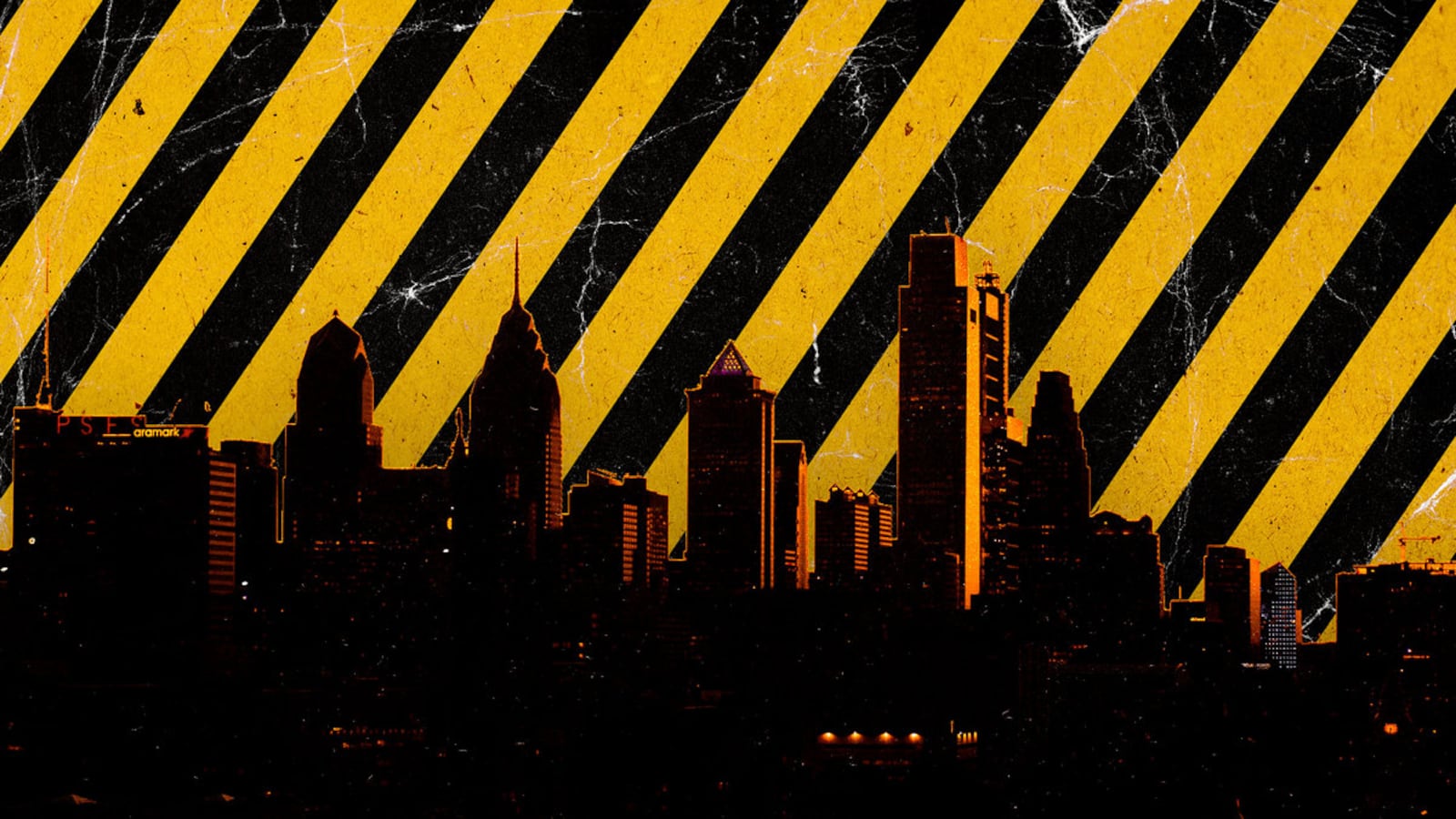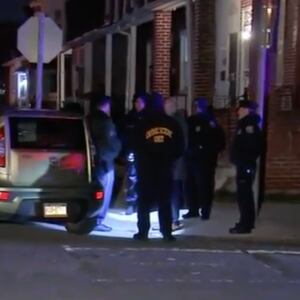At 4:30 p.m. on Wednesday, a 55-year-old woman in South Philadelphia was talking to a man near a red pickup when she suddenly became alarmed.
“No!” she can be heard crying in a video that appeared on Twitter.
The woman dashed across the street as the man reached into the back of the truck and ran after her. He had a gun in his upraised right hand.
“Call 911! Call 911! Call 911! Call 911!” she screamed.
The man fired five times, the shots sounding more deliberate than hurried. The woman pitched to the pavement, fatally wounded. Her death became the city’s 500th homicide this year, matching the all-time record set in 1990. And there were still 38 days left in the year.
“Each and every homicide carries with it a profound sense of loss,” Philadelphia Police Commissioner Danielle Outlaw said in a statement. “However, for our City to have reached such a tragic milestone—500 lives cut short—it carries a weight that is almost impossible to truly comprehend.”
The latest homicide victim had been in her final seven hours of life at 9:30 that morning, when this upcoming milestone in mayhem prompted Mayor Jim Kenney to hold a press briefing at City Hall. Kenney stood with Outlaw and various city, state, and federal officials, along with a host of community leaders.
“It’s just crazy,” Kenney said of the unprecedented carnage. “It’s just crazy and this needs to stop.”
Back in 1990, 67.4 percent of the killings involved firearms. The number now exceeds 80 percent. Kenney focused on the easy availability of firearms in the city due to lax state laws. The legislature has prohibited any municipality from setting its own gun-control measures.
“We know that common sense regulation of guns would save lives,” Kenney said. “We have [only] to look across the river to New Jersey where strong, strong gun laws mean that the per-capita rate of the gun deaths is less than half the rate in Pennsylvania.”
Kenney said he could fill his car trunk at one of the big gun shows held regularly in the nearby town of Oak and sell them to felons back in the city with little worry of getting in trouble. The Republican-controlled legislature recently rejected Philadelphia’s attempt to require residents to report the loss or theft of a firearm. And that meant someone who sells a felon a gun can simply invent an explanation if it is used in a homicide and gets traced back to him.
“‘It got stolen out my car’… ‘My house got burglarized’… ‘I lost it,’” Kenney said. “There’s no consequences whatsoever. That’s insane. That person should go to jail along with a person who used it to kill somebody.”
In the meantime, police are on track to recover in excess of 6,000 crime guns this year—2,000 more than last. And Commissioner Outlaw was able to tell the briefing that although the number of homicides was breaking a record, the murder rate had declined slightly in recent weeks.
That bit of good news amid the killing was likely due in part to the police concentrating on problem “pinpoint zones.” Some credit should also go to the violence interrupters who are hard at work. Council Member Curtis Jones went so far as to declare, “There is hope.”
Jones reported that anti-violence activists from an organization called House of Umoja were at that very moment knocking on doors in West Philadelphia, asking people to sign the Imani Pledge of Peace. The vow originated in 1974, when 32 city gangs called a truce and joined together to protect a farmer’s market. The present pledge applies to the current holiday, when we are supposed to count our blessings, not record-breaking murders.
“Just for the Thanksgiving weekend to Monday that we are not gonna shoot each other, that we gonna let people live so that they can have a peaceful Thanksgiving,” Jones said.
The efforts of such peacemakers and various city agencies and social service groups, along with the police department, is coordinated by the Office of Police and Strategic Initiatives for Criminal Justice and Public Safety, headed by Erica Atwood. She spoke to The Daily Beast of plans to address everything from intergenerational trauma to economic viability in what she noted is the poorest big city in America. But she has joined the mayor in focusing at the moment on the flow of firearms into Philadelphia.
“We are looking at a jurisdiction that doesn’t have any control over how guns come in and out and what the penalties are around that,” she told The Daily Beast. “So that’s where we’re really focused… how do we remove the instruments of harm?”
Atwood said much the same at the briefing, where among those in attendance was Chantay Love, whose 20-year-old brother, Emir Greene, had been fatally shot seven times in the back on March 26, 1997. She still had the hurt in her voice when she spoke to The Daily Beast about him on Tuesday night.
“He was an artist, he drew,” she recalled. “He was a funny guy. It was no big deal for him to come home with a homeless person who had not eaten and we were then feeding. He couldn’t see people go without.”
Such a loss, she said, “changes the DNA of the entire family.”
She and her mother, Victoria Love, made an acronym with Emir’s name when they founded the victim’s assistance group Every Murder Is Real (EMIR). The authorities notify EMIR every time there is a homicide in Philadelphia so her group can do what it can to assist the family. Most of the killings receive little or no public attention.
But the whole nation was shocked on Nov. 21, when 32-year-old Jessica Covington and her unborn child were shot to death as she unloaded presents from her baby shower. She was shot 11 times in the stomach, leading detectives to believe the gunman was deliberately seeking to end a life before the first breath. The investigation is ongoing.
This was two day after 24-year-old Sykes Patton was shot to death as she walked her twin 4-year-old sons home from school. Police have arrested her 28-year-old ex-boyfriend, Donovan Crawford. The case was recorded as the 35th domestic violence killing of the year, up from 18 in all of 2020. The mayor has suggested that the rise might be related to the pandemic, when “people were shut up in their homes, going crazy.” But that could also apply to much of last year, and it seems there must be something else going on.
“We have a pandemic and an epidemic,” Love said.
On Tuesday, Love was notified that a security guard and a man from Lancaster, Pennsylvania, had gotten into a deadly dispute at Christmas Village, a German holiday market set to officially open on Friday. Police say the security guard went to his car to fetch a pistol from a bag. The result was the city’s 499th homicide of the year.
The city was one killing away from tying its all-time record when Love became the last speaker at the City Hall. She described the pain suffered by all families that have lost a loved one to homicide, not just those who have become the subject of public attention.
“When you lose someone, your life is completely changed,” she said. “You are not the family you used to be. That block has changed. That school is different. That business is different. That hospital is different.”
And this is particularly true on holidays such as Thanksgiving.
“A sweet potato ain’t the same,” she said. “A turkey ain’t the same.”
She reported that one young survivor had texted her: “Hey queen, you know, struggling.”
And she read aloud her reply: “We love you and believe in you. You are smart enough to be the best God meant you to be. You are motivated enough to go after your dreams and make it happen. You are brave enough to say no to anyone and anything that does not work in your best interests. You have the courage to ask for help. You learn from your lessons and mistakes. You are great.”
She told the group that in bringing all of the agencies and officials and activists together, the record-breaking violence might lead them to finally end it.
“This is different because we all are coming together for one solution,” she said. “The world is watching and we’re going to produce. We ain’t the only city, but we are the one that got the courage to say we going to win this one.”
She declared that her greatest ambition is to be put out of business.
“We won’t stop until we are not wiping no more tears. Until I’m not asking, ‘I need to hire another five counselors this week.’ Until somebody is coming to my door and saying, ‘Hey sister, Shante, queen love. I heard y’all packing y’all bags and going to something different.’ And I’m going say, ‘Yes.’”
In the meantime, she will continue to be alerted every time another family needs her group’s assistance. She left City Hall on Wednesday morning knowing it was just a matter of time before the record-breaking 500th homicide. That came less than six hours later. She awaited the notification that would again begin the process of trying to heal what cannot be completely healed.
“It’s usually the next morning,” Love said.
That would make it Thanksgiving, when turkey is not the same for those who have lost a loved one.






